We have and 5 Scanning Electron Microscope (SEM) calibration blocks and one for a Backscattered Electron Detector
(BSED).
BSED Calibration block
SEM Calibration Blocks.
Resolution Standard.
There is a choice of three different Resolution standards used for testing the
resolution of the SEM. Both large and small gaps are resolvable from the gold crystals grown on a graphite substrate. A certificate of calibration is included in the price for each one..These standards are
supplied mounted on a 6mm dia. removable mount.These standards are supplied as Gold particles on Carbon in the following sizes .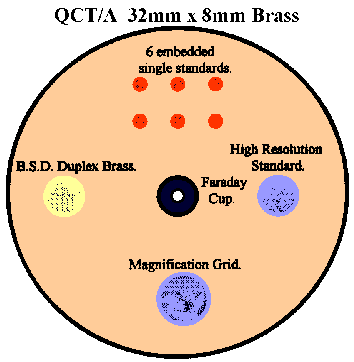
Medium Resolution
This is an option for a single standard block, (QCT/A & QCT/AA),5nm-15nm or the second standard in a two standard block (QCT/B & QCT/BB & QCT/C). Approximate magnification required
50,000 to 200,000 times. High Resolution This is the resolution standard contained in the price quotation 2nm-30nm for a block with one standard. (QCT/A & QCT/AA) Approximate magnification
required 50,000 to 250,000 times. Magnification Grid.
There is one Magnification Calibration Grid. This is used for the Calibration of the
Magnification of the SEM. It's construction is a 5mm x 5mm Single Crystal Silicon square of material. On the silicon is produced lines with Electron Beam Lithography,
in a square grid pattern. The Border grid squares are 500 by 500 microns. Inside these are 10 x 10 micron pitch grid squares of approximately 1.9 micron line width.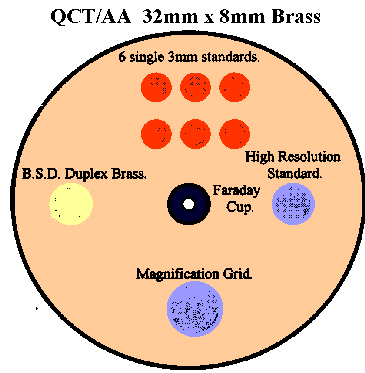 A Certificate of calibration is included in the price. A Certificate of calibration is included in the price.The magnification grid is
mounted on an 8mm dia. removable mount, ensuring that if in future there is a need to replace this standard with a different one, it can be done easily and with minimum cost. 6 Single Standards.
Six standards can be
supplied as specified by the customer from our extensive range of over 250 different standards in either embedded or as 3mm single standards. Certificates of analysis are included in the price of the
block for each standard. If the system has an Energy Dispersive X-Rayanalysis system attached, then one of these standards could be Cobalt, which is a common standard for calibration. BSD Duplex Brass.
One 5mm dia. removable standard of Duplex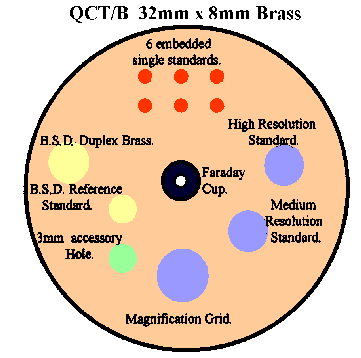 Brass is included. This is used for checking the resolution and
performance of the Backscattered Electron Detector. The resolution of a detector is usually quoted as 0.1 (Z) where the atomic number (Z) = 30. This is obtained in our Standard by the mean atomic
number between the phases of a/b Brass, being 0.1 Z. Brass is included. This is used for checking the resolution and
performance of the Backscattered Electron Detector. The resolution of a detector is usually quoted as 0.1 (Z) where the atomic number (Z) = 30. This is obtained in our Standard by the mean atomic
number between the phases of a/b Brass, being 0.1 Z.
Faraday Cup.
The Faraday Cup is included and is use to measure the probe current.
This is a parameter of vital importance in micro-analysis for fully quantitative analysis. BSD Reference Standard.
This is one of our dual standards used to calibrate and check the Backscattered
Electron Detector with a resolution of one atomic number (1Z). There is a choice of 4 standards to choose from. AlSi (Z=13/14); Ni/Cu (Z=28/29); Pd/Ag (Z=46/47); Pl/Au (Z=78/79). 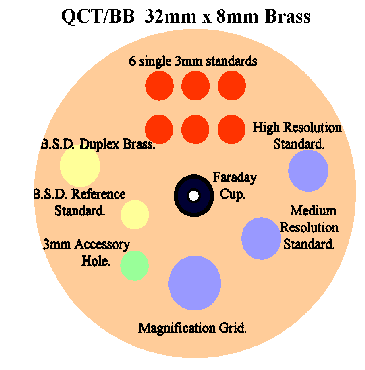 Certificates of analysis are included in the price of the block. It is
mounted in a 3mm dia. removable block. Certificates of analysis are included in the price of the block. It is
mounted in a 3mm dia. removable block. 3mm Accessory Hole.
Three of the Blocks have a 3mm accessory hole which can be used for any standard the customer would like or left empty. If the system has an Energy
Dispersive X-Ray analysis system attached, then this standard could be Cobalt, which is a common standard for calibration.
Standard Block.
One of the blocks (QCT/C 5Omm dia.) has a hole of either 25mm or 32mm in
which the customer can insert his own block of standards. Alternatively we can supply custom blocks of standards in either 25 or 32 mm dia. With over 250 different standards to choose,
from our extensive range, we can mount up to 52 standards in a 25 mm dia block. General.
Our standards are diamond polished to a 0.25 mm 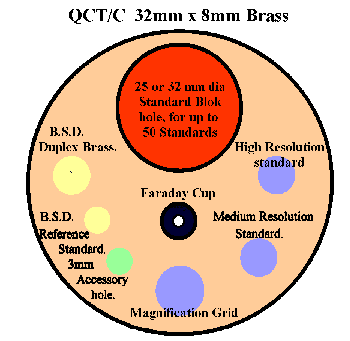 finish and coated with approximately
250Å (can be customer specified) of carbon to reduce charging produced by the electron beam. finish and coated with approximately
250Å (can be customer specified) of carbon to reduce charging produced by the electron beam. It is recommended that Blocks of standards are
returned to us for Re-polishing and Re-coating every two years. This service is performed at a nominal fee for our customers and will reduce contamination to the standard surface which will adversely affect the
performance of the standard. |



